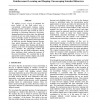Free Online Productivity Tools
i2Speak
i2Symbol
i2OCR
iTex2Img
iWeb2Print
iWeb2Shot
i2Type
iPdf2Split
iPdf2Merge
i2Bopomofo
i2Arabic
i2Style
i2Image
i2PDF
iLatex2Rtf
Sci2ools
ICML
2002
IEEE
2002
IEEE
Reinforcement Learning and Shaping: Encouraging Intended Behaviors
We explore dynamic shaping to integrate our prior beliefs of the final policy into a conventional reinforcement learning system. Shaping provides a positive or negative artificial increment to the native task rewards in order to encourage or discourage behaviors. Previously, shaping functions have been static: the additional rewards do not vary with experience. But some prior knowledge cannot be expressed as static shaping. We take an explanation-based approach in which the specific shaping function emerges from initial experiences with the world. We compare no shaping, static shaping, and dynamic shaping in the task of learning bipedal-walking on a simulator. We empirically evaluate the convergence rate and final performance among these conditions while varying the accuracy of the prior knowledge. We conclude that in the appropriate context, dynamic shaping can greatly improve the learning of action policies.
Related Content
| Added | 17 Nov 2009 |
| Updated | 17 Nov 2009 |
| Type | Conference |
| Year | 2002 |
| Where | ICML |
| Authors | Adam Laud, Gerald DeJong |
Comments (0)

